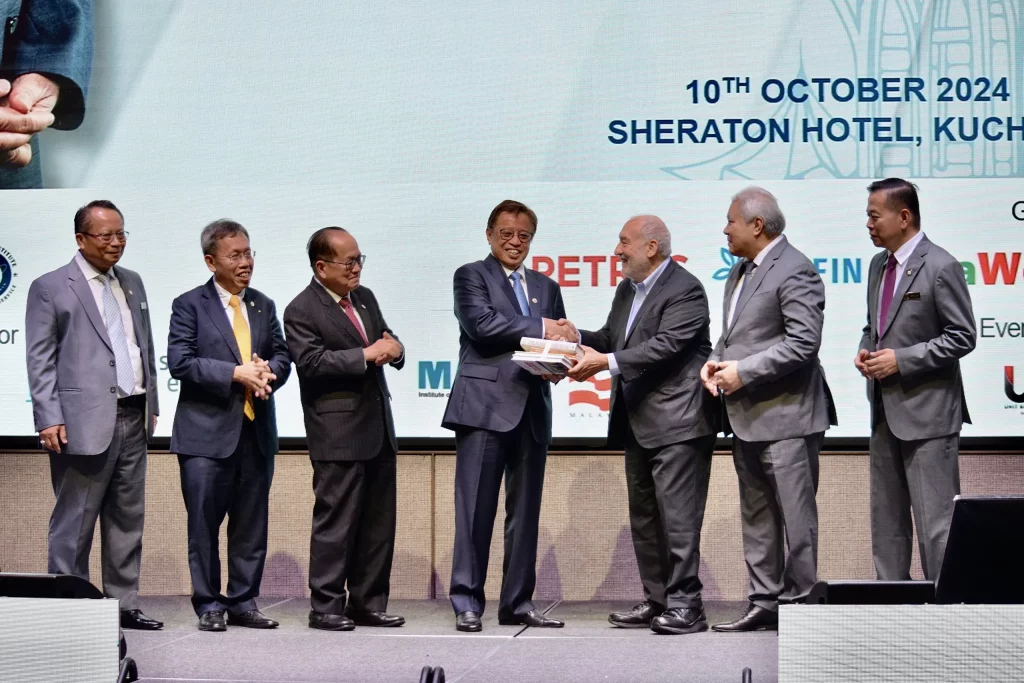
KUCHING (Oct 10): Sarawak is transitioning towards a green economy that prioritises sustainable development while minimising environmental degradation, said Datuk Patinggi Tan Sri Abang Johari Tun Openg.
The Premier said this shift focuses on decoupling economic growth from carbon emissions and resource depletion, ensuring long-term economic and ecological resilience.
“Sarawak is laying the groundwork for a future where financial success is aligned with environmental stewardship by integrating renewable energy sources such as hydropower, solar, and biomass,” he said in his keynote address at the Sarawak Future Forum here today.
Noting that while Sarawak was historically reliant on oil, gas, and timber, Abang Johari said the state’s economy is now diversifying in response to the global shift towards low-carbon economies.
“Recognising the finite nature of these traditional resources, the state is pivoting toward renewable energy, digital innovation, and human capital development.
“The Post Covid-19 Development Strategy (PCDS) 2030 serves as a roadmap for this transformation, embedding environmental sustainability as a fundamental component of economic progress,” he said.
He pointed out that a cornerstone of Sarawak’s economic transformation is its commitment to renewable energy.
“With substantial hydropower capacity, the state already leads the region in clean energy production.
“However, Sarawak is expanding its renewable portfolio, targeting an impressive 15GW capacity by 2035. This strategic expansion positions Sarawak as a regional powerhouse in green energy, capable of exporting sustainable power to neighbouring countries, including Singapore, Indonesia, and beyond,” he said.
He also said that green hydrogen is at the forefront of Sarawak’s clean energy strategy where the state aims to become a key exporter of hydrogen, particularly to South Korea and Japan, aligning with their national net-zero strategies.
“Furthermore, Sarawak is developing a robust hydrogen transportation and storage infrastructure, allowing for seamless export to international markets.
“By leveraging its geographical advantage and proximity to key Asian economies, Sarawak can become a major supplier of clean hydrogen, further diversifying its economy,” he said.
On Sarawak’s digital transformation, Abang Johari said this extends to urban development, where the region invests in smart city initiatives to optimise city management and improve residents’ quality of life.
“Artificial Intelligence (AI) and the Internet of Things (IoT) are being integrated into infrastructure systems to enhance efficiency in areas such as traffic management, energy distribution, and public services.
“These smart city initiatives are not just about improving urban living—they are also aligned with Sarawak’s broader climate goals.
“By making cities more efficient and sustainable, Sarawak is reducing its environmental footprint while enhancing the liveability of its urban areas,” he said.
The Premier said the principle of inclusivity also lies at the heart of the Sarawak government’s development strategy.
“Social equity must be a guiding principle as we develop policies and programmes that ensure every Sarawakian, regardless of background, has access to opportunities for education, employment, and entrepreneurship.
“To truly measure our success, we must ask ourselves, ‘Are we creating a society where everyone has a chance to succeed? Are we building a future where no one is left behind?’ These are the questions that must guide our work in the years ahead,” he said.
On the forum, Abang Johari said the inaugural event has brought together global experts, thought leaders, and practitioners from diverse fields, including Nobel laureate Prof Joseph Stiglitz, a global leader in economic thought who has long championed the need to move beyond gross domestic product as a measure of success.
“It is our hope that through these discussions, we will gain new perspectives and insights on how to create a more just and sustainable economy.
“Sarawak is ready to learn, to adapt, and to lead in areas that matter most to the future of our planet – whether it be green energy, renewable energy, sustainable agriculture, or digital innovation,” he said.
The Sarawak Future Forum is organised by the Sarawak Centre of Performance Excellence (Scope) and Leadership Institute of Sarawak Civil Service (LISCS), in partnership with The New York Times, Institute of Management Sarawak (Masa), and the American-Malaysian Chamber of Commerce (AMCHAM).
Among those present were Deputy Premiers Datuk Amar Douglas Uggah Embas, Datuk Amar Awang Tengah Ali Hasan, and Datuk Amar Dr Sim Kui Hian; State Secretary Datuk Amar Mohamad Abu Bakar Marzuki; and Deputy State Secretary (Economic Planning and Development) Datu Dr Muhammad Abdullah Zaidel.

